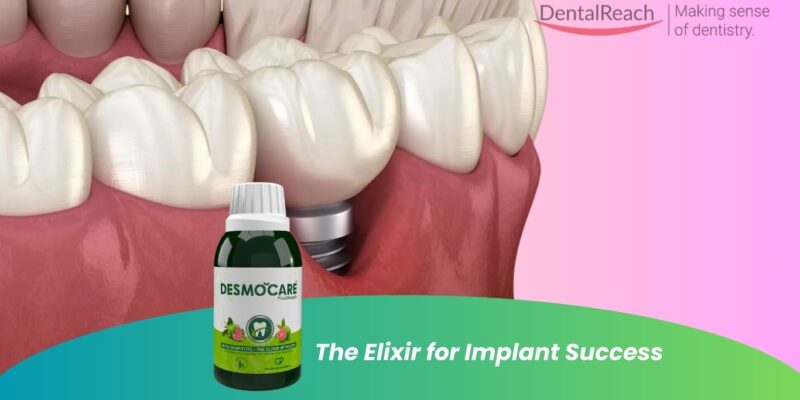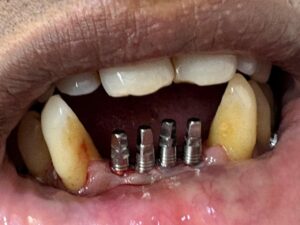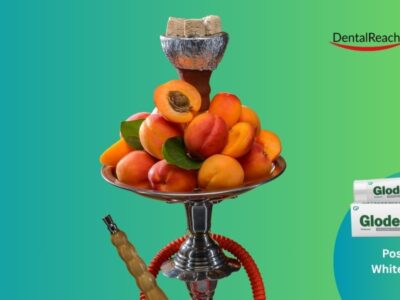A Novel Method to Treat Peri-Implantitis
(This is a part of the ‘Implant Dentistry– Updated Yet Simplified Series’ by prosthodontist & implantologist Dr Nupur Shrirao)
Peri-implantitis (PI) is a pathological condition that affects the tissues surrounding dental implants and has been reported as the major cause of implant failure; PI and periodontal diseases are characterized by tissue inflammation and bone damage. In homeostasis conditions, reactive oxygen species (ROS) have been shown to be involved in cell maintenance, signal transduction, and repair of all tissues, but ROS overaccumulation leads to oxidative stress, which generates cell damage and tissue destruction; likewise, antioxidants protect against the destructive effects of ROS by turning free radicals into waste products. Clinicians suggest that use of anti-oxidant products, such as Desmocare mouthwashes, may prove beneficial for long-term prevention of PI.
Peri-Implantitis – The Implantologists’s Enemy
There are definite inflammatory and clinical relationships that could lead to PI, due to the role that oxidative stress (OS) plays in these conditions. Consequently, this leads to absence or hampering of osseointegration in dental implants, which directly affects the success of treatment. Known risk factors of PI include:
- periodontal disease (the main risk factor)
- poor oral hygiene,
- bacterial plaque,
- occlusal overload,
- diseases such as diabetes mellitus, and
- smoking
It has been reported that people with poor oral hygiene and a smoking habit have three times greater probability of suffering PI. Periodontal disease has been identified as the major risk factor for developing PI, and is a negative indicator for implant survival.
It is worthy to note that most of these risk factors increase the oxidative stresses in the oral cavity. Studies are now discovering that increased levels of oxidative stress in saliva may be associated with peri-implant disease.
Role of Oxidative Stress in PI and Anti-oxidants to Counter it
After placement of a dental implant, an inflammatory healing response occurs. Angiogenesis is one characteristic of this process, which contributes the cells and oxygen that are important for osseointegration. In a study, Tsarik et al. analyzed the damage to endothelial cells and found cytotoxicity and inhibition of cell proliferation when cathodic corrosion of Ti was induced. They observed that ROS and H2O2 were sub-products of the corrosion process and that these particles harm endothelial cells. If dysregulation in the inflammatory process and accumulation of ROS particles over the implant and surrounding tissues occurs, aseptic loosening of the implant may also occur.
An antioxidant, is defined as a substance that protects or prevent cells and DNA from the damage induced by free radicals, which are converted into waste products and are eliminated. Human body does not have the ability to neutralize large amounts of free radicals. Hence, healthcare experts advise to consume natural antioxidants in the diet that are capable of neutralizing free radicals.
Antioxidants may play a role to prevent or control PI. They have shown potential in
- neutralizing ROS to prevent tissue damage
- promoting bone healing
- having protective effects on the periodontium
- reducing implant failure rates, and
- enhancing the long‐term stability of dental implants.
Anti-oxidants Which Can be Used in PI
Preclinical and clinical studies have explored the use of antioxidants, such as vitamin E and selenium, to modulate the bone–implant interface and mitigate oxidative damage, ultimately improving the success rate of dental implant procedures.
Studies are being done for more alternatives which are readily available, naturally occurring and relatively affordable, such as guava leaf extracts and honey.
Guava Leaf Extract
Guava is rich in vitamin C and quercitin, both of which are essential in maintaining the periodontium. Guava leaf extracts have the ability to scavenge free hydrogen peroxide, superoxide anion radicals and inhibit the formation of hydroxyl radical thereby reducing the chances of oxidative tissue damage. Extract of guava leaves is effective against both gram negative as well as gram positive bacteria. Extract of guava acts as an antiplaque agent because it inhibits the growth of Staphylococcus aureus (S. aureus) and S. mutans.
A study was done to evaluate the use of guava leaf extract as a phytochemical therapy for periodontitis. It found that it showed a similar reduction in gingival index, plaque index and probing pocket depth values as chlorhexidine – suggesting that guava leaf extracts as a local drug delivery is highly effective and comparable to the gold standard currently used in such periodontal disease.
Another study found that quercetin found in these extracts, is vital in alleviating inflammation by inhibiting inflammatory mediators in a controlled manner. It proposed the medicinal value of quercetin rich fractions in treating periodontal disease, and subsequently, peri -implant disease.
Honey
Honey is a powerful antimicrobial agent with a wide range of effects.
Glucose oxidase is an enzyme present in honey that converts glucose into gluconolactone and then to H2O2. This H2O2 is released in a slow and continuous manner to achieve a sustained antibacterial effect. This successfully eliminates microorganisms but dilutes them sufficiently so as not to damage the host tissue (Olaitan et al. 2007).
The acidity of honey (pH 3.2–4.5) inhibits the growth of many pathogenic organisms and enhances the wound healing process through epithelialization.
Desmocare is a mouthwash used as a local drug delivery agent combining guava leaf extracts and honey with sodium perborate. Its patent combination molecule Desmotite™ reduces oxidative stress, combats inflammation, provides natural antiseptic care and eliminates harmful microorganisms while providing gentle, natural antiseptic care for long-term implant maintenance.
How Desmocare Works:
- Guava leaf extract delivers powerful antioxidant action by scavenging and neutralizing excess free radicals that cause oxidative stress. Its strong anti-inflammatory properties reduce swelling while supporting post-surgical tissue healing.
- Sodium perborate reduces oxidative stress and activates honey’s antibacterial properties.
- Honey releases hydrogen peroxide for gentle antimicrobial care and cell nourishment.
- Collectively, these combined ingredients also work to disrupt bacterial biofilms, reduce infection and lower the risk of peri-implant disease.
Case Example
Dr Sunil Kumar, an implantologist from Bengaluru, noticed a faster healing of gingiva post implant surgery when patients were prescribed antioxidant mouthwashes like Desmocare.
 He also noticed less biofilm formation in his periodontitis patients and regularly prescribes the mouthwash to his patients for its anti-oxidant effect.
He also noticed less biofilm formation in his periodontitis patients and regularly prescribes the mouthwash to his patients for its anti-oxidant effect.
 Conclusion
Conclusion
The article highlights the potential of potent antioxidants in preventing and managing oral diseases like peri-implantitis, promoting oral health, and enhancing the outcomes of dental implants. Use of localised agents like anti-oxidant mouthwashes like Desmocare, are an excellent way to achieve this. This commercially available product, researched and manufactured by Group Pharmaceuticals, combines readily available, naturally occurring and relatively affordable substances like guava leaf extracts, honey and sodium perborate which achieve the desired anti-oxidant effect.





















Comments